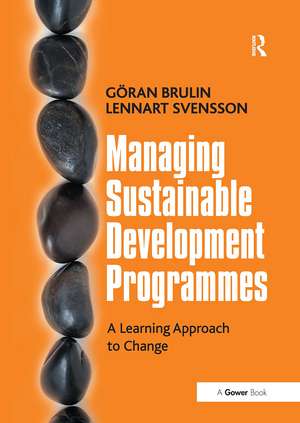Managing Sustainable Development Programmes: A Learning Approach to Change
Autor Gran Brulin, Lennart Svenssonen Limba Engleză Paperback – 24 iun 2024
Preț: 209.25 lei
Preț vechi: 273.45 lei
-23% Nou
Puncte Express: 314
Preț estimativ în valută:
40.05€ • 41.49$ • 33.42£
40.05€ • 41.49$ • 33.42£
Carte tipărită la comandă
Livrare economică 21 martie-04 aprilie
Preluare comenzi: 021 569.72.76
Specificații
ISBN-13: 9781032836928
ISBN-10: 103283692X
Pagini: 232
Dimensiuni: 174 x 246 mm
Greutate: 0.43 kg
Ediția:1
Editura: Taylor & Francis
Colecția Routledge
Locul publicării:Oxford, United Kingdom
ISBN-10: 103283692X
Pagini: 232
Dimensiuni: 174 x 246 mm
Greutate: 0.43 kg
Ediția:1
Editura: Taylor & Francis
Colecția Routledge
Locul publicării:Oxford, United Kingdom
Public țintă
Professional Practice & DevelopmentCuprins
Chapter 1 Running Programmes for Sustainable Development; Chapter 2 Models of Change and Evaluation; Chapter 3 Key Research Findings; Chapter 4 Evaluation for Sustainable Development; Chapter 5 Lessons from Earlier Programme Initiatives; Chapter 6 Lessons from Competence Initiatives; Chapter 7 Innovation and the Regional Fund; Chapter 8 Owning, Steering and Evaluating Large Programmes; Chapter 101 Afterword;
Notă biografică
Göran Brulin is a senior analyst at the Swedish Agency for Economic and Regional Growth. He is also adjunct professor in local and regional innovations at the University of Linköping, at the HELIX Excellence Center. Brulin is responsible for the on-going evaluation and interactive research of the Swedish Regional Structural programmes. Lennart Svensson is a professor in Sociology at the University of Linköping, and a research leader at the HELIX Excellence Center. His research is about local and regional change, project work, learning evaluation, gender equality, workplace learning, and union work. Svensson is the author or co-author of over 30 books. Svensson and Brulin co-authored 'Learning Through On-going Evaluation' (Studentlitteratur 2009).
Recenzii
'As we circle around the "elephant of innovation" this valuable book helps take our blinders off and better understand the process of transition from the tri-partite model of industrial society (government-industry-labour) to the triple helix model of a knowledge- based society (university-industry-government) in which academic institutions play a key role in promoting entrepreneurship.' Henry Etzkowitz, Stanford University, Human Sciences and Technologies Advanced Research Institute (H-STAR), USA 'Göran Brulin´s and Lennart Svensson´s treatise stands out from the pack of management literature due to its unusual focus on long-term, large, government-funded programs for innovation in combination with the authors´ indisputable experiences from such interventions at the Swedish as well as the multi-national and multi-cultural European level. Read it and learn!' Evert Vedung, Emeritus Professor of Political Science, Uppsala University, Sweden 'Based on a new analysis of why many large-scale publicly funded programmes prove unsustainable, Brulin and Svensson make a compelling case for projects for competence development to be embedded in the dynamics of real workplaces, with all their uncertainties, risks and creative potential. Active ownership of the learning processes is an essential ingredient if innovation to be energised and development sustained.' Karen Evans, Chair in Education, Institute of Education, University of London, UK ’The authors have strong background in understanding Swedish political, social environment and economics and development programs. While their focus is centralized towards their local studies, their suggested improvements to traditional program management by adding ownership, collaboration and development can be applied globally. Development in these areas can lead to innovation to improve success rates on any size project.’ PM World Journal, vol. 1, no. 4 ’The authors make a strong case for developing on-going evaluation p
Descriere
Managing Sustainable Development Programmes is about understanding the difficulties and complexities of large change programmes and projects in both the private and public sectors. The authors' research reveals an extraordinary level of failure in these projects, the analysis of which overturns much of our traditional thinking about project deliver
